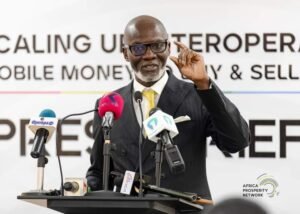
Ato Essien, founder of defunct Capital Bank
The Attorney-General (A-G) has rejected a proposal by William Ato Essien, founder of the defunct Capital Bank, who is standing trial for allegedly collapsing the bank, to refund GHC27.5 million to the state.
A chief state attorney, Ms Marina Appiah Opare, told the Accra High Court yesterday that the proposal by Mr Ato Essien and his lawyers is totally unacceptable.
According to her, Mr Ato Essien and his lawyers have presented another proposal which the A-G had responded to. She, therefore, prayed the court to adjourn the case to allow the two sides to conclude negotiations.
Hearing continues on July 9, 2020 at the court presided by Justice Eric Kyei Baffour.
Refund
Mr Ato Essien is standing trial together with three others on allegation of collapsing Capital Bank
The GHC27.5 million that Essien wants to pay is part of a GHC620 million liquidity support given to Capital Bank by the Bank of Ghana (BoG) between June 2015 and November 2016.
It is the case of the prosecution that Essien and the other accused persons engaged in various illegal acts that led to the dissipation of the GHC620 million liquidity support.
With regard to the GHC27.5 million, the prosecution has accused Essien of carrying it in jute bags which he distributed to some individuals for business promotion purposes.
Mr Ato Essien wants to refund the money, per Courts Act, 1993 (Act 459), so that four of the 19 charges levelled against him by the state would be dropped.
Escape
The decision by Essien to refund the GHC27.5miilion to the state is a legal move under Section 35 of Act 459 meant to escape prison sentence.
He has ostensibly pleaded guilty to taking possession of the amount and is willing to correct his wrong for a lesser punishment.
Under Section 35 (1) of Act 459, a person accused of an offence, which had caused “economic loss, harm or damage to the state or state agency, may inform the prosecutor whether the accused admits and is willing to offer compensation or make restitution and reparation for the loss, harm or damage caused.
Section 35 (2) of Act 459 states that when an accused makes an offer of restitution, the prosecutor shall consider whether the offer is acceptable or not and inform the court.
In the event that the offer is not acceptable to the prosecution, the trial shall continue, but if the offer is acceptable, the accused person will plead guilty and the court will convict him on his own plea.
When passing sentence, the court will then order the accused to pay the restitution based on conditions set by the court.
However, per Section 35 (7) of Act 459, if the accused person fails to fulfill the conditions set by the court for the payment of the restitution, the court shall pass a custodial sentence on him.
Background
The trial of Essien, Odonkor, Nettey and Quartey Papafio was the first criminal case in relation to the banking crisis that rocked the country in 2017 and 2018.
Capital Bank was one of the first banks that collapsed after a massive clean-up of financial institutions by the Bank of Ghana (BoG), started in 2017.
On August 14, 2017, its licence and that of UT Bank were revoked by the BoG, after it had declared them insolvent.
The central bank allowed the state-owned bank, GCB Bank, to acquire the two banks in order to protect depositors’ funds and also enable them to stay afloat.
Source: Daily Statesman


